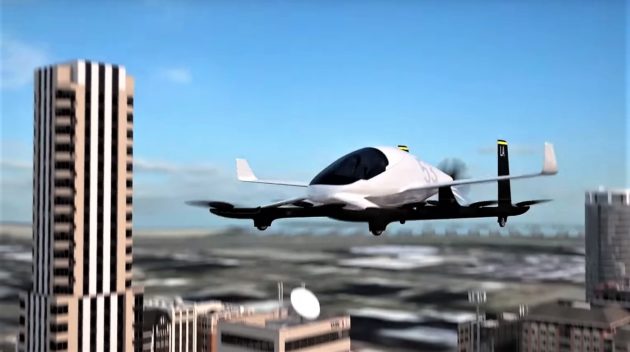
The market for autonomous flying cars — also known as eVTOL aircraft, air taxis or personal air vehicles — could amount to nearly $1.5 trillion by the year 2040, according to an in-depth analysis from Morgan Stanley Research.
The financial company’s 85-page report, distributed to clients this week, draws together data from a host of sources, including a private-public symposium on urban air mobility that was conducted last month in Seattle.
“We see the development of the UAM [urban air mobility] ecosystem as extremely long-dated and requiring up-front capital allocation, testing and development in the short term, with increasing visibility;” said Morgan Stanley’s research team, which includes senior analyst Adam Jonas.
The players include Boeing, which is working with its subsidiary, Aurora Flight Sciences, to field a flying-car prototype next year; and Airbus, which is involved in air taxi ventures including Vahana in Silicon Valley and Voom in Brazil and Mexico. Just this month, Airbus and Audi demonstrated a scaled-down version of an eVTOL craft — that is, an electric-powered, vertical-takeoff-and-landing air vehicle — at a drone industry show in the Netherlands.
“Lockheed Martin is investing in eVTOL autonomous aircraft, and we believe Northrop Grumman is likely involved as well, while Raytheon and Harris are targeting air traffic control technology,” Morgan Stanley said in its report.
A wide array of startups are in the eVTOL race as well. The running list includes Uber, Opener, Kitty Hawk, Joby Aviation, Terrafugia, VerdeGo Aero, the Dutch venture PAL-V, China’s EHang, Germany’s Volocopter and Lilium, Switzerland’s Passenger Drone, Slovakia’s AeroMobil and Japan’s Cartivator Project. Even Aston Martin and Rolls-Royce, two stalwarts of the British automotive and aerospace industries, are in the running.
Morgan Stanley said flying cars could complement the delivery drone operations that companies including Amazon and Wing (a Google spin-out) are contemplating. “Shipping is Amazon’s second-largest cost … and flying cars could reduce delivery costs in both rural and traffic-congested urban areas,” the report said.
Passenger travel is expected to account for most of the market in 2040, amounting to $851 billion in Morgan Stanley’s base-case scenario.
“We see the market beginning as an ultra-niche add-on to existing transportation infrastructure, similar to how helicopters operate today,” the analysts said. “It eventually transforms into a cost-effective, time-efficient method of traveling short to medium distances, eventually taking share from car and airline companies.”
Freight transportation would account for $413 billion of the market, with $12 billion coming from military and defense applications. The report throws in another $198 billion for enabling technologies and services, ranging from batteries to autonomous control software.
Morgan Stanley cautioned that the rise of the flying-car market would have to be supported by favorable currents in technology as well as the regulatory environment. The key challenges will include upgrading energy storage density in next-generation batteries, mitigating noise and using artificial intelligence to meet rigorous safety standards for autonomous flight.
“Fully functional autonomous aviation may need to improve to a level significantly greater than that of conventional EVs/AVs [electric vehicles / autonomous vehicles] for road transport over the next 10 years,” the report said.
Morgan Stanley drew up a list of companies called the “Flying Car 50” to highlight market opportunities ranging from aerospace and defense (for example, Boeing, Airbus and the top airlines) to tech hardware (Apple and Garmin) and insurance (Progressive).
Amazon and Microsoft are also on the list … of course. “We believe MSFT is best positioned in air traffic management cloud service and data management,” the analysts wrote.



